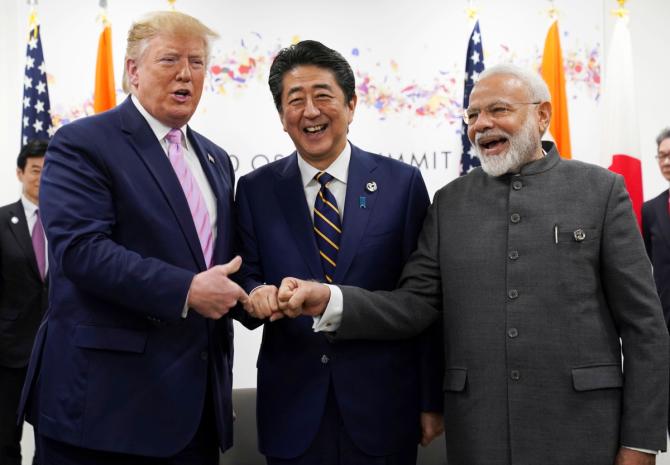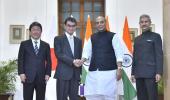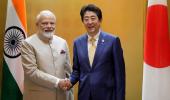Prime Ministers Modi and Abe enjoyed a close and empathetic relationship and this certainly gave a sustained momentum to the India-Japan strategic partnership.
It is necessary for India to reach out and engage with his successor as early as possible, advises former foreign secretary Shyam Saran.

Abe Shinzo has resigned after an unprecedented eight years in office, making him the longest serving prime minister of Japan.
He will be missed in Japan where he was able to orient the country towards a more forward looking economic strategy with his 'three arrows' of an expansive monetary policy, a flexible fiscal policy and structural reforms to raise productivity and restore growth.
He may not have achieved all his objectives, but Japan's extended period of economic stagnation did give way to modest stirrings of life.
COVID-19 has dealt a severe blow to Japan's economy, but its recovery will probably require more of 'Abenomics' than less. One should expect Abe's economic legacy to endure.
Under Abe, Japan became a less diffident power in Asia and beyond.
He raised his country's profile in a region coming to terms with the rapid rise of Chinese power and influence.
He had to walk a tightrope between a China with which the Japanese economy was deeply integrated and a US more sharply confrontational with China but somewhat unpredictable and even whimsical towards its own allies including Japan. He managed this delicate act quite successfully.
This will become more difficult as the post-Covid world begins to fragment, becomes more polarised and economies large and small withdraw behind protectionist walls.
In dealing with this altered economic environment, Abe has positioned Japan in a relatively good state.
It is under his leadership that the Trans-Pacific Partnership, a mega high-standard regional free trade agreement has survived despite the US under Donald Trump walking out.
Japan is part of the Regional Comprehensive Economic Partnership (RCEP) which brings together 10 Asean countries, Japan, South Korea, China, Australia and New Zealand.
India disappointed Japan and other RCEP partners by walking out of the final phase of negotiations due to concerns about China flooding the Indian market with cheap goods. Thus, Japan remains a key player in shaping the emerging economic and trade architecture in Asia.
This means that any successor government in Tokyo is unlikely to follow the American lead in 'decoupling' with the Chinese economy, though the country will continue to diversify its external economic interests away from over-dependence on China.
This must be appreciated by Indian policymakers who nourish an exaggerated notion of Japanese capital seeking to exit China and looking at India as an alternative destination.
Abe was very focused on countervailing Chinese influence in the region and to this end prepared to encourage Japanese business and industry to look at India as an investment destination offering both scale and growth prospects.
India largely disappointed him on that score and Japanese interest in China has strongly revived over the past few years.
A successor prime minister may be less interested in pursuing an active and expanding diplomatic and security role in the region, balancing economic engagement with China.
Interest in partnership with India may well diminish.
When India rejected being part of China's Belt and Road Initiative, Japan, too, stayed away. However, currently Japan is both competing and collaborating with China on BRI projects.
The India-Japan Africa Corridor project announced in 2016 with much fanfare has mostly faded into the background. The economic pillar of the India-Japan strategic partnership is weak and likely to decline further in the post-Abe era.
It is in the India-Japan security relationship that the Abe period witnessed the most significant advance.
On his visit to India in August 2007, during his first and brief term as prime minister, Abe announced his vision of the 'Confluence of the Two Oceans' or what later became the Indo-Pacific and the notion of 'free and open Indo-Pacific'.
He saw the potential of the concert of democracies forming a 'Quadrilateral' to contribute to a new balance of power in the Indo-Pacific.
Under his initiative, the first Quad meeting among India, US, Japan and Australia took place in Manila in 2007, but the US scuttled further engagement in order not to jeopardise Chinese and Russian support on the Iran and North Korean nuclear issues.
It is to Abe's credit that he led the Quad's revival in 2017 persuading India to agree, because he was convinced of India's critical role as a security partner.
India and Japan now have annual 2+2 meeting of their foreign and defence ministers, which has raised their security cooperation to a high level.
A bilateral Acquisition and Cross-Servicing Agreement that would mutually allow access to each other's defence facilities and provision of support was concluded at the Modi-Abe summit this month.
It would be fair to say that India-Japan security relations have expanded rapidly and substantively during Abe's tenure. It remains to be seen whether a new political dispensation in Tokyo will bring the same energy and enthusiasm to the security engagement that Abe did.
One should also not underestimate the personal role Abe played in enabling the landmark India-Japan nuclear deal in 2017 overcoming very strong opposition of Japan's powerful non-proliferation lobby.
This deal is the most important after the original India-US nuclear agreement.
But it is less known that Abe helped in India getting a waiver at the Nuclear Suppliers Group.
I had travelled in 2007 to Tokyo as a special envoy to canvass support and had met Taro Aso, the then foreign minister.
At the formal meeting he read out a rather harsh and discouraging brief given to him by his officials.
However, as he accompanied me to the lift he whispered to me that I should convey PM Abe's message to our then PM that Japan would support India at the NSG. And that contributed significantly to our success.
Prime Ministers Narendra Modi and Shinzo Abe enjoyed a close and empathetic relationship and this certainly gave a sustained momentum to the India-Japan strategic partnership.
It is necessary for India to reach out and engage with his successor as early as possible.
India-Japan relations will remain crucial to India's pursuit of its economic and security interests.
Shyam Saran is a former foreign secretary and a senior fellow, CPR.











 © 2025
© 2025